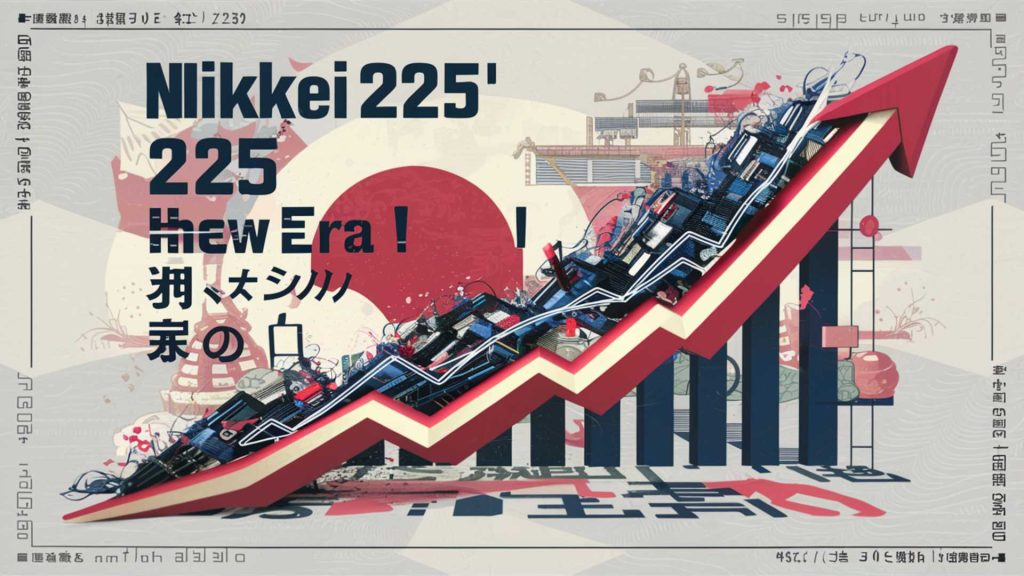Surge in Japan’s Stock Market
Nikkei stock market: Japan’s Nikkei 225 index achieved a remarkable milestone, soaring to a record-breaking high, indicative of a robust and thriving equity market. Fueled by significant gains in banking, electronics, and consumer stocks, the index experienced a nearly 2% increase, reaching 39,029 points. This achievement not only surpassed the previous high of 38,915.87 set in 1989 but also marked a new era of investor optimism and confidence in the Japanese economy.
The Driving Forces Behind the Rally
Several factors have contributed to the extraordinary performance of Japan’s stock market. Notably, the strong corporate earnings reported by Japan Inc. for the third quarter have played a crucial role. Recognizing this strength, Bank of America equity strategists revised their year-end forecasts for 2024, setting new targets for both the Nikkei 225 and the Topix indices.

Moreover, the depreciation of the yen, which has lost about 6% against the dollar this year, has further propelled the market’s momentum. This currency trend has made Japanese exports more competitive internationally, benefiting investors and companies alike.
Investor Enthusiasm and Government Reforms
Investor interest in Japanese equities has surged, partly influenced by Warren Buffet’s optimistic stance on Japan. Additionally, the Japanese government’s efforts to enhance corporate governance have been met with positive reception. These reforms aim to improve shareholder returns and have encouraged more foreign investment in Japan’s largest and most liquid stocks.
Key Market Performers
| Sector | Performance Increase |
|---|---|
| Banking | Significant |
| Electronics | Notable |
| Consumer Stocks | Substantial |

Investment Highlights
| Indicator | Detail |
|---|---|
| Foreign Investment | Over 2 trillion yen in January |
| Corporate Earnings Growth | 45% increase in Oct-Dec period |
| Currency Depreciation | 6% drop against the dollar this year |
The Impact of Monetary Policies and Inflation
Japan’s financial landscape has been uniquely shaped by its monetary policies, including the maintenance of the world’s last negative interest rates regime despite rising inflation. This policy stance, alongside the expectations of a shift in April, underscores the complexity of Japan’s economic challenges.
Challenges and Expectations
While the weakening yen has bolstered export sectors, it has also strained consumer purchasing power, raising concerns about domestic consumption. Moreover, Japan’s GDP contraction, leading to its position being overtaken by Germany, highlights the need for strategic economic adjustments.
Conclusion
The Nikkei 225’s historic rally is more than a numerical milestone; it represents a confluence of strategic corporate practices, government reforms, and investor confidence. As Japan navigates through its monetary policies and inflation challenges, the world watches closely, anticipating the next steps in this economic evolution.
This comprehensive analysis sheds light on the dynamics of Japan’s stock market, offering insights into the factors driving its success and the challenges it faces. As we look to the future, the trajectory of Japan’s Nikkei 225 and broader economic policies will undoubtedly continue to attract global attention.
The Nikkei 225 is a stock market index for the Tokyo Stock Exchange (TSE). It is a price-weighted index, composed of Japan’s top 225 publicly-owned companies, representing a wide array of industries.
A weaker yen increases the competitiveness of Japanese exports by making them cheaper for foreign buyers. This can boost the profits of Japanese exporters, many of which are constituents of the Nikkei 225, thus positively affecting the index.
The Nikkei 225 hit a record high due to a combination of factors, including robust corporate earnings, favorable investor sentiment, and supportive government policies aimed at enhancing corporate governance. A weaker yen also contributed, making Japanese exports more competitive.